It might not be a stretch to say that every Nepali takes pride in proclaiming, “Buddha was born in Nepal.” Nothing wrong with that. What, however, is shameful is that we are very very short on compassion, something the historical Buddha introduced to the world. For the record, Buddha was also against the caste system, the Hindu social system, that highly corrupting system.
In the system, Dalits (see image below) are slotted into the so-called “lowest caste”, and viewed, and treated, as “untouchables” — defiled and defilers.
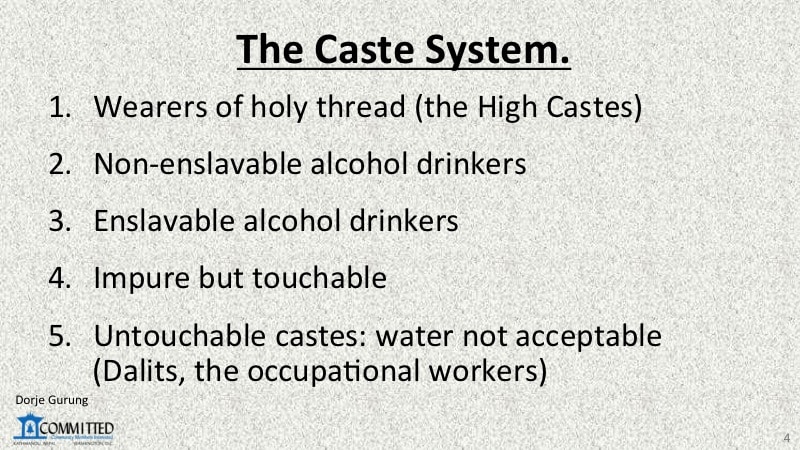
So, throughout the three-centuries or so long casteist modern history of the country, nowhere near as long as since Buddha’s birth mind you, they have been dehumanized. Consequently, even in the 21st century, Dalit Nepalis (and others) live out — or suffer from — the legacy of that, which, I am confident, led to Rupa Sunar, a Dalit, to make her tweet.
In the tweet she she proclaims, “I don’t have the patience anymore to wait for the gradual change you keep saying is coming. I desire to live as a human being today.” In the video itself she says, “I want to reiterate, in the question of my desire to live as a human being, no one should be allowed to tell me ‘There will be gradual change.’ I desire to be a human being from today, and members of my social group should be able to live life as a human being from today itself.”
तिमिले भन्ने गरेको विस्तारै हुने परिवर्तन पर्खने धैर्यता छैन अब म संग । मलाई आजै बाट मान्छे भएर बाँच्नु छ। pic.twitter.com/2edaxrceK4
— Rupa Sunar (@RupaSunar4) October 24, 2021
The responses of Nepalis to the tweet, however, firstly, demonstrate the existence of those so poorly educated that they appear to have no clue about the caste system. Secondly, they also comfirm something I have discovered in the last several years: many Nepalis live in complete denial of our casteist history. Thirdly, the sentiments expressed demonstrate how the caste system has corrupted the minds of many.
In other words, forget acknowledge her desire, forget display some compassion and empathy for her and her community’s plight stretching generations and lasting centuries, forget recognize the urgency in her desire — most of the responses are everything from just petty to shameful to, in many cases, horrendously dreadful.
Here’s the first three. The first one asks, “What change [do you seek]?” The second one says, “Dollar-farming dogs who talk about caste and religion to destroy society have no right to live in this society nor to be alive.” The third one says, “Dalit word and the mentality should be removed. The rest my new generation don’t care about.”
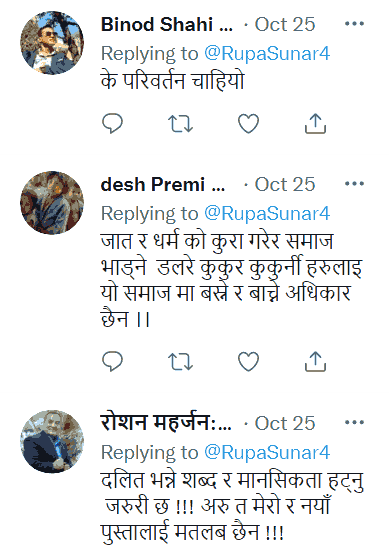
Here’s two more. The first user casts aspersions on her intention by saying, “Looks like the opportunity for you to earn dollars has opened up.” The second one makes a veiled but vile and dreadful characterization of Sunar and others from her social group. “@ManaviPoudel received her answer. After behaving like an animal for 2000 years, all of a sudden ‘Let’s all think like a human being’ said Manavi sister, apparently.” She adds, “I guess Manavi sister should also provide medication for this contagious disease of depression that has been passed down from generation to generation for generations[.]”
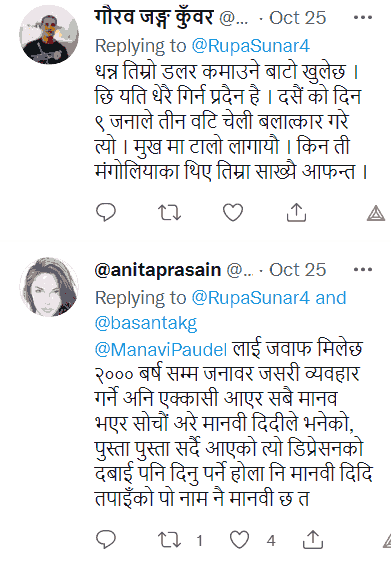
The first one below, again, accuses her of being a “dollar-farmer” and says, “Illegitimate Children of dollar-farmers can never be a human being; give up dollars little girl. Then you’ll become a human.” The second one provides a completely irrelevant response: “And members of your social group should be allowed to continue benefiting from affirmative action (reservation) as a Dalit.” The third one calls on her to “make it possible for a tailor [one of the Dalits] to eat at a cobbler’s [another Dalit] and free yourself from the belief that you are a Dalit.”
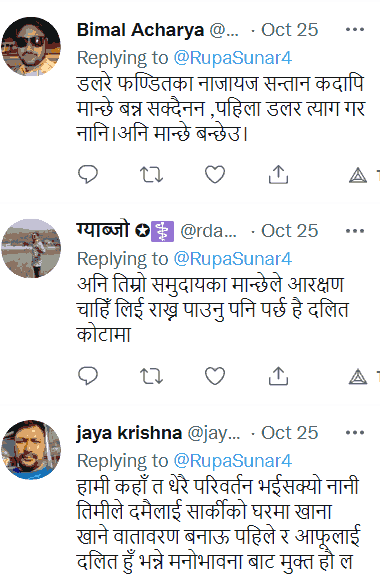
In the set below, the first user curses out Sunar, calling her a “whore.” “Who has told this whore that she is NOT human[?]” The second user says,”Today you made me laugh a lot. Some time ago, you made a landlady cry.” (The reference is to Sunar filing a cases against a landlady, accusing her of reneging on her rental agreement on discovering that she was a Dalit.) The third user says,”This dollar-farming little girl’s brain is corrupt.” I bet the irony is lost on the user!
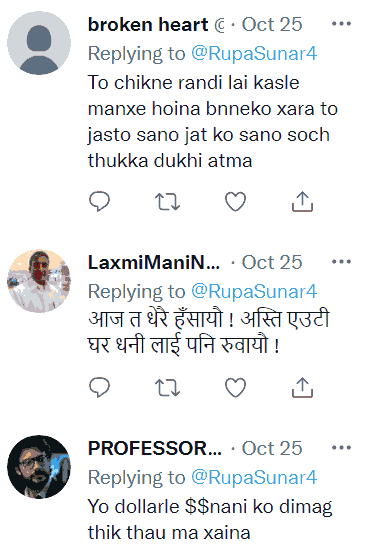
Here’s another set, none much different.
I find it amusing and sad that some of these people are telling her to be/act like a human being first!
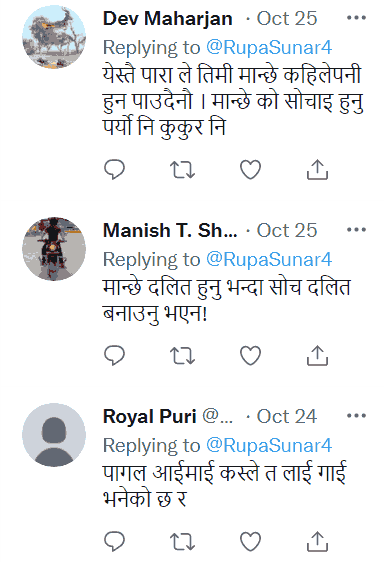
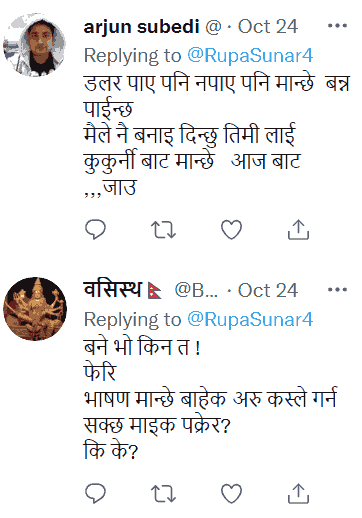
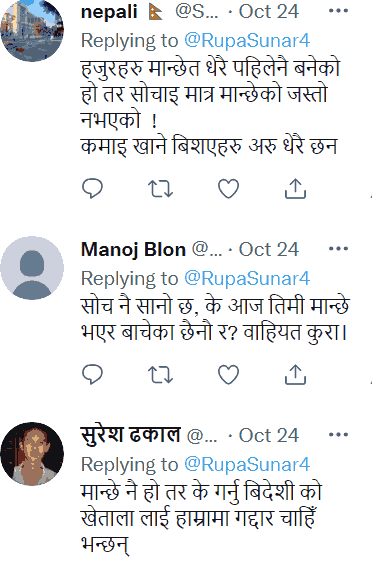
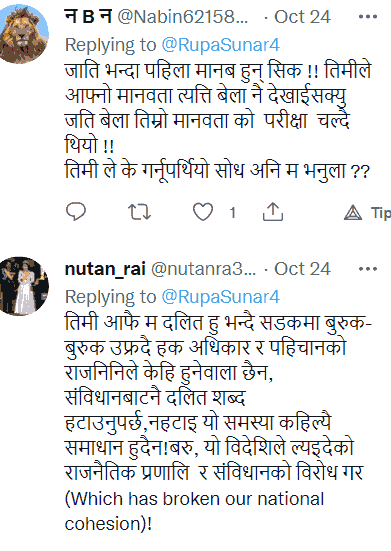
Have you had enough yet? Here’s some more and, again, because they are pretty much more of the same, I am NOT translating them. There is ONE outlier however. I challenge you to find it!
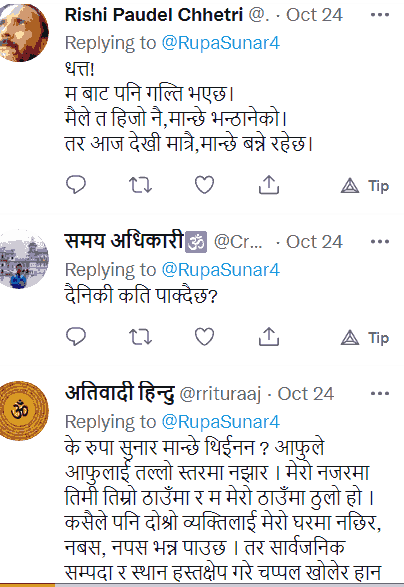
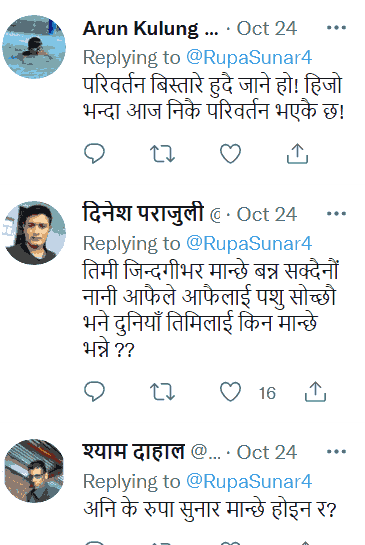
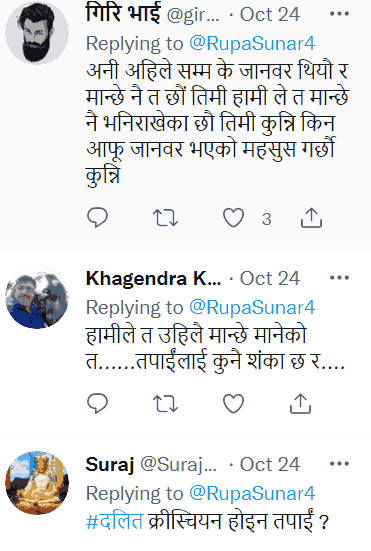
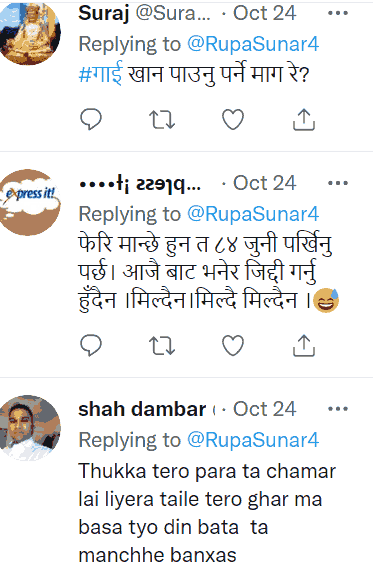
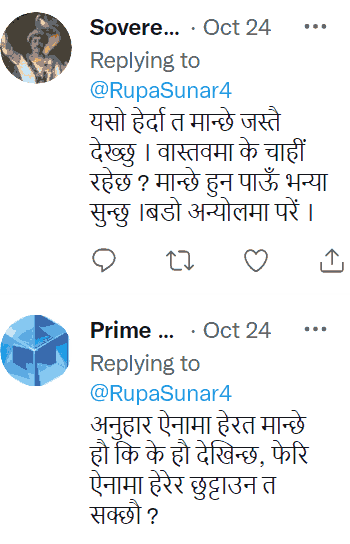
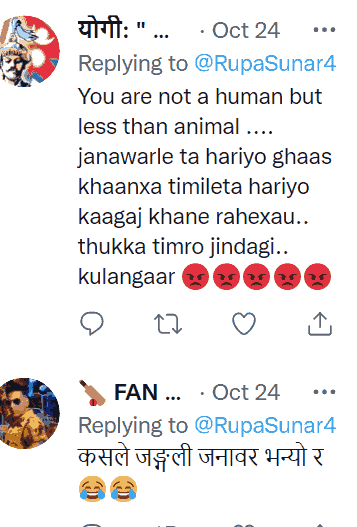
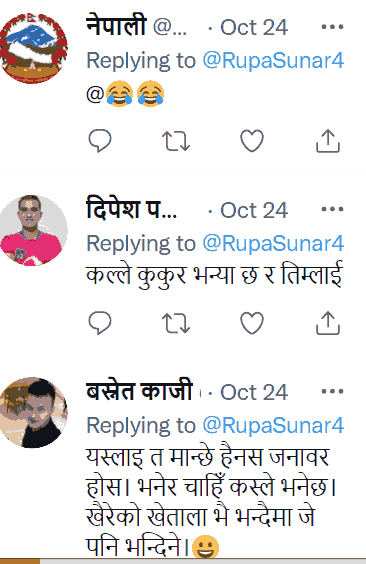
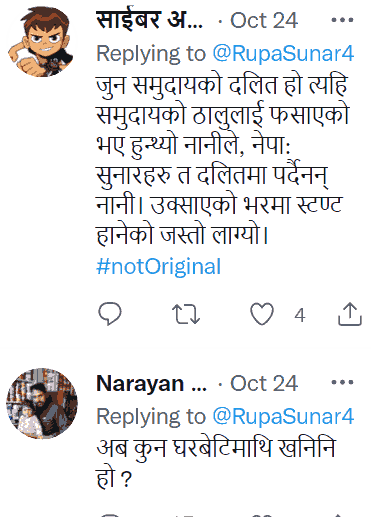
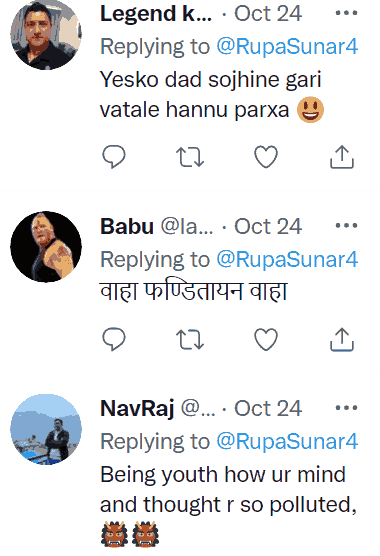
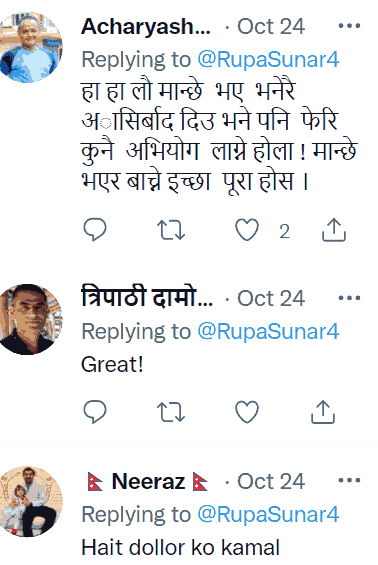
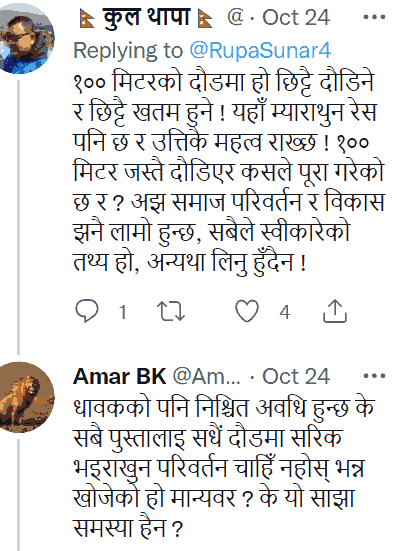
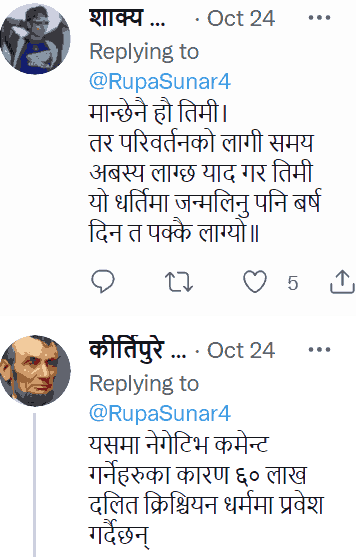
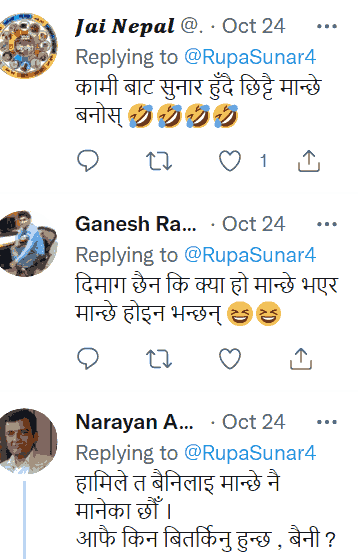
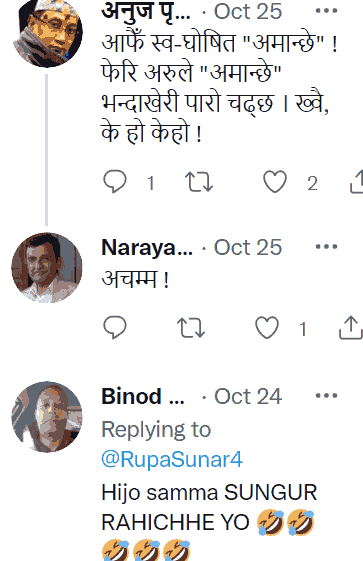
You might be surprised to learn that the responses shared above aren’t all!
The following are reproductions of some of the retweets quoting the original tweet. And, again, they are incredibly shameful!
The highly patronizing and crude retweet below is accompanied by the following text: “Barking on the streets like so makes you a dog more than human little sister. So be a human first.”
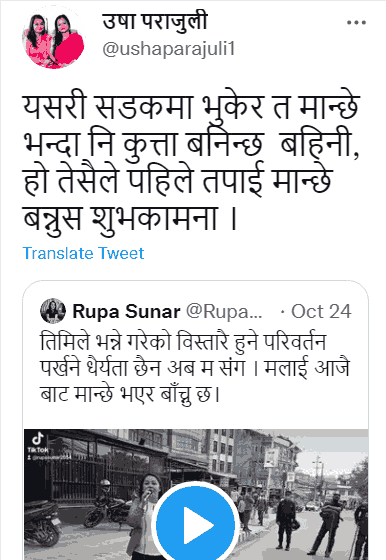
Here’s some more of the same.
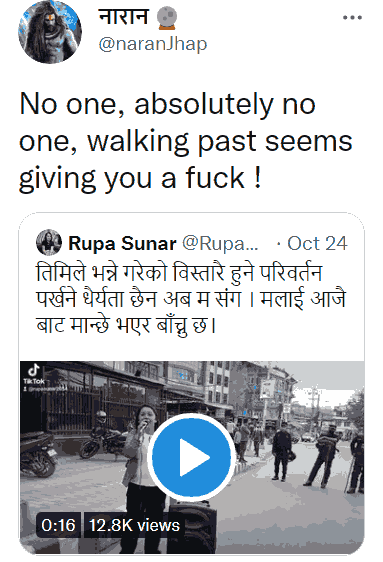
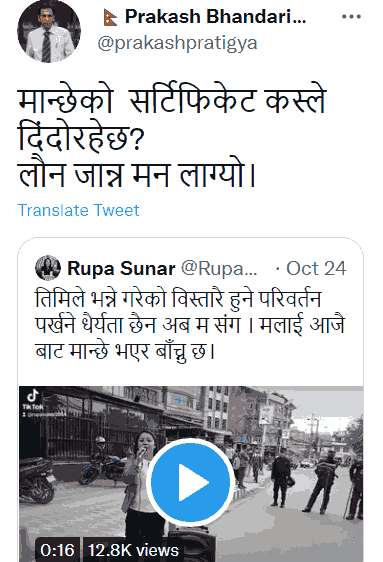
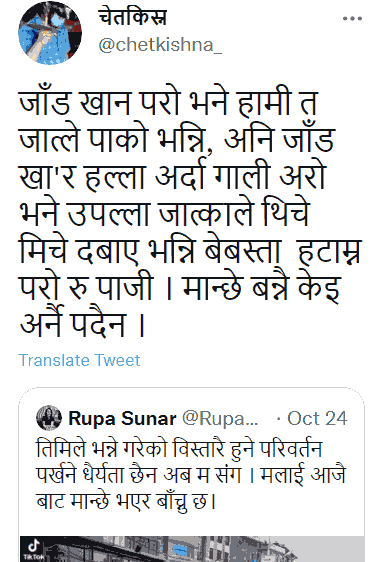
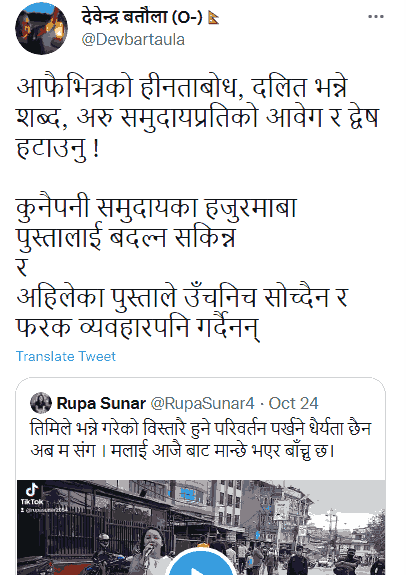
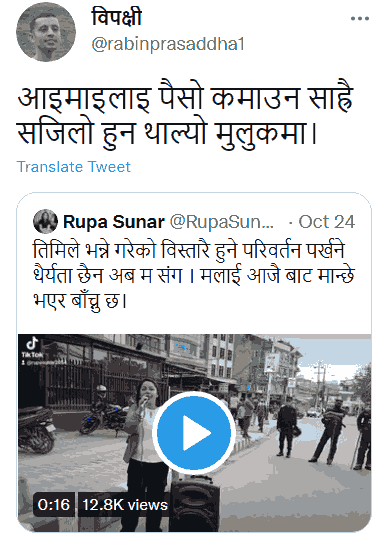
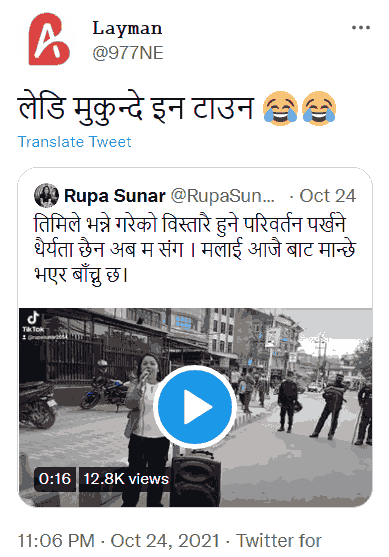
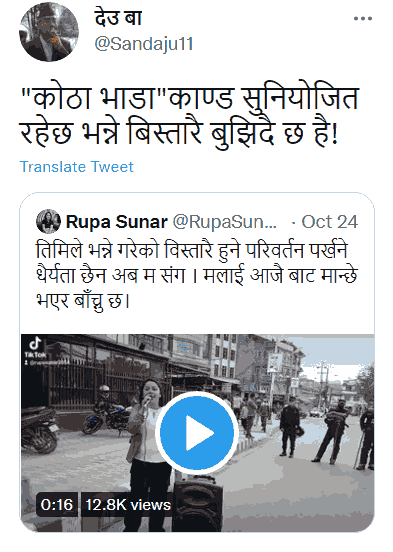
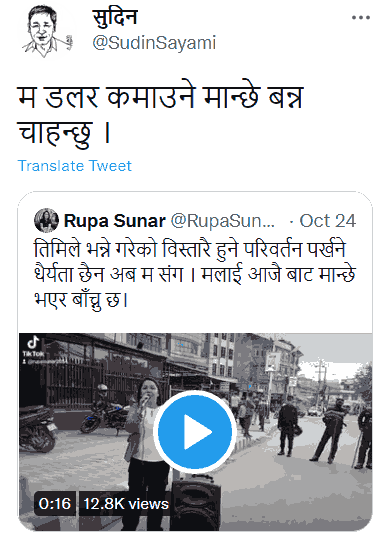
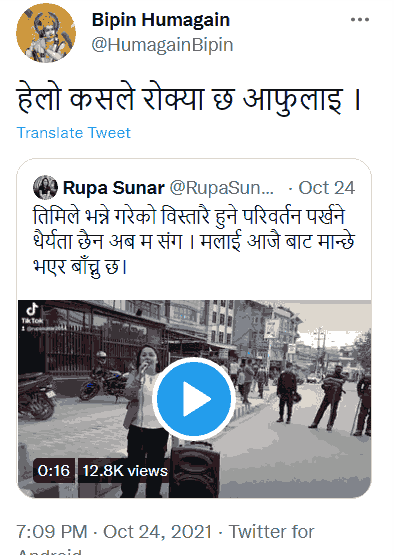
The utter lack of compassion and humanity in many of those reactions to what on the surface appears to be a simple request from Sunar, but actually reveals the profoundly flawed nature of our caste-based society, reconfirms that very nature! In other words, such callous and compassionless reactions to a Dalit’s tweet is to our deeply flawed and hollow caste-based society as casual sexism is to rape culture.
And finally, to be sure, they didn’t come across Sunar’s tweet and, just out of the blue, decide to react with those words. The evident caste system-corrupted minds of those users — denigrating her, hurling wanton, vile personal attacks, questioning her character and intention etc. — is a legacy of the casteist social, cultural, economic, and political history of the country, assisted by the abysmally poor education system.
Since returning to Nepal, I keep coming across reasons to feel ashamed to be — or to call myself — a Nepali. This is one of them.
What do you think?
Additional Materials
To begin with, this blog post used materials from this twitter thread. Additionally, I have written a great deal about the caste system and, if you are interested in the details I have alluded to in this blog, follow the links below.
- Buddha Was Born… is about how Nepalis should focus on what he taught in addition to taking pride in his birth in the country.
- The Story of Eklavya and Dronarcharya: More of Caste Supremacy Than Model Discipleship is about how the mythology exemplifies the terror tactics used to suppress Dalits and others, among other things.
- Birth is a Beginning…Not an End…As the Hindus Would Have You Believe is about the Hindus’ belief that the caste you are born into is a consequence of ones past-life actions (Karma) and therefore deserved.
- Caste System Can Corrupt The Mind, Kill The Spirit, And Strip One of Humanity is about how Nepal is in denial of the caste system and their dehumanization of Dalits, all arising from the belief that the caste one is born into is “deserved,” that birth is an end instead of the beginning that it is.
- Like Gods, Like Humans? Or, Like Humans, Like Gods? Or, Like…F*cked up? is about how some in Nepal justify prohibiting Dalits from practicing their religion by entering temples, for example, by saying that the Gods themselves discriminate against Dalits!
- Social Justice: Caste Away is about how Nepali society viewing and treating Dalits (and others) as inferior because of their low-caste birth and forcing them to live their lives in shame as a “punishment” is wrong and, if anyone should be ashamed, it should be those who interpret their birth caste as such and make them suffer.
- Grade 8 Social Studies Textbook: The Caste System Is a “small” Issue is about how that’s the ONLY entry about the system in the whole textbook.
- Social Justice: Want Compassion? Show Compassion! is about how Dalits were DELIBERATELY prevented from receiving relief materials in some places and, in others, provided left overs following the quakes of 2015.
- Caste Out is the personal story of life-long discrimination and abuse a Dalit suffered from.
- Caste System Fostered and Propped up Groupism in Nepal Corrals People into Small Social Circles Part I is about how Nepalis are still highly tribal.
- So You Think There is No Caste-based Discrimination in Nepal? Think Again! reproduces a twitter thread — started in July 2018 — documenting incidences of discrimination and abuse Dalits suffer from.
